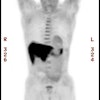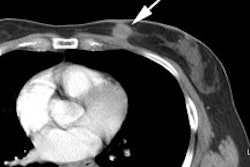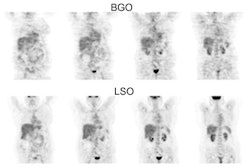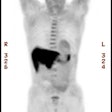Lerman H, Metser U, Grisaru D, Fishman A, Lievshitz G, Even-Sapir E.
The purpose of the study was to assess physiologic endometrial (18)F-FDG uptake during the 4 phases of the menstrual cycle and to differentiate between physiologic and malignant endometrial uptake. METHODS: Endometrial (18)F-FDG uptake, expressed as standardized uptake value (SUV), was measured on PET/CT images of 285 consecutive female patients, of whom 246 (112 premenopausal and 134 postmenopausal) had no known gynecologic malignancy and 39 (14 premenopausal and 25 postmenopausal) had cervical, endometrial, or ovarian cancer. RESULTS: Two peaks of increased endometrial (18)F-FDG uptake were identified during the 4-phase cycle. The mean SUVs were 5 +/- 3.2 and 3.7 +/- 0.9 in menstruating and ovulating patients, respectively, and 2.6 +/- 1.1 and 2.5 +/- 1.1 in patients in the proliferative and secretory phases, respectively. The mean endometrial SUV in postmenopausal patients not receiving hormonal therapy was 1.7 +/- 0.5. Oligomenorrhea and benign endometrial abnormalities were associated with increased (18)F-FDG uptake. Neither contraceptives nor hormonal therapy was associated with a significant increase in endometrial uptake. In addition to the increased tumor uptake measured in patients with cervical cancer (14.9 +/- 7.3 in postmenopausal patients and 12.2 +/- 6.6 in premenopausal patients), increased uptake was also found in the adjacent endometrium, although it appeared normal on CT (4.8 +/- 2 in premenopausal patients and 4.7 +/- 2.8 in postmenopausal patients). Increased ovarian (18)F-FDG uptake was detected in 7 patients with ovarian cancer (9.1 +/- 4) and in 21 premenopausal patients without known ovarian malignancy (5.7 +/- 1.5, P < 0.01), of whom 15 were at mid cycle and 3 reported oligomenorrhea. An ovarian SUV of 7.9 separated benign from malignant uptake with a sensitivity of 57% and a specificity of 95%. CONCLUSION: In premenopausal patients, normal endometrial uptake of (18)F-FDG changes cyclically, increasing during the ovulatory and menstrual phases. Increased uptake in the endometrium adjacent to a cervical tumor does not necessarily reflect endometrial tumor invasion. Increased ovarian uptake in postmenopausal patients is associated with malignancy, whereas increased ovarian uptake may be functional in premenopausal patients.






